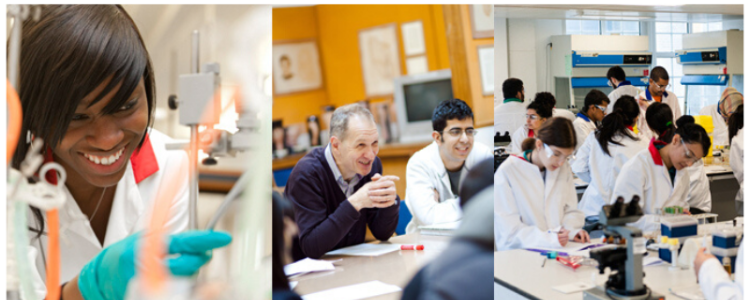Genetics is a fast moving moving and expanding field that is transforming medicine, agriculture, biotechnology, and biomedical research, with huge impacts on our daily lives.
This information for life resides in the genetic material known as DNA. Geneticists study the way DNA is replicated, repaired, and decoded to make protein and other molecules within cells and tissues, which in turn impact the physiology, behaviour, and wellbeing of living things. Genetics provides a framework for understanding all living processes on the planet, from microorganisms and viruses to plants, animals and indeed ourselves.
Molecular Genetics is a modern discipline in Genetics that seeks to understand the nature of inherited characteristics at a molecular level in terms of DNA and RNA structure, sequence, modification, and other factors that influence gene activity.
Genomics is an emerging discipline in genetics that applies new technologies to study the function and activity of the complete set of genes in a living thing, from bacteria to humans. Genomics is set to become a major part of healthcare where individuals are personally diagnosed and treated based on their own genetic information.
Today, Genetics has broad applications that reflect its central importance in medicine, agriculture, biomedical research and biotechnology. The knowledge of DNA at a molecular level provides tools for manipulating gene sequences such as genome editing that forms the basis of genetic engineering. The understanding of how genes and genomes work provides insights into disease and avenues for developing new therapies. Our programmes therefore enable our graduates to capitalise on career opportunities opened up by revolutionary advances in Genetics and Genomics.

Why study Genetics at King's?
- Benefit from integrated modules and programmes that combine both theory and hands-on research
- 94% student satisfaction (National Student Survey 2020)
- Our programmes of study and modules are carefully designed to meet the specialised needs of students interested in diverse areas, including biomedical research, biotechnology, and medicine
- Our teaching integrates both theory and practical work to reinforce learning, and take advantage of unique opportunities from the work of our research active staff to be at the forefront of Genetics
- Our course draws on our unique strengths in biomedical research to deliver cutting-edge knowledge and exposure to state-of-the-art techniques in our modules.
Welcome to the Department of Genetics
We are delighted to be based at the institute where some of the key observations were made to solve the structure of DNA, the molecule at the heart of genetics. The Department is responsible for the Genetics programmes and modules at King’s. We are dedicated to delivering the highest quality education with considerable practical experience to all our students. We aim to train our students to become either the researchers of the future or to join a variety of scientific careers, or non-scientific careers which value an ability to collect and analyse data. We have great ambitions for our students and we are very happy to say that we have been rated the top Department at King’s College, London for teaching satisfaction in the National Student Survey for the last four years.
UCAS Code: Not applicable. Apply direct to King's.
Duration: One year
Healthcare Genetics and Genomics Intercalated BSc online prospectus
View course
UCAS Code: C400
Duration: Three years, or four years with a year abroad or extra-mural year, or four years with transfer to MSci
Study for the BSc Molecular Genetics degree in the School of Bioscience Education at King's College London.
View course